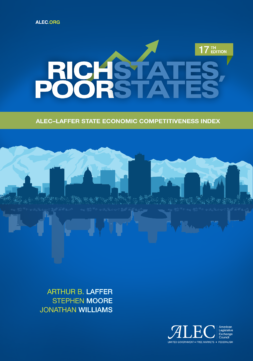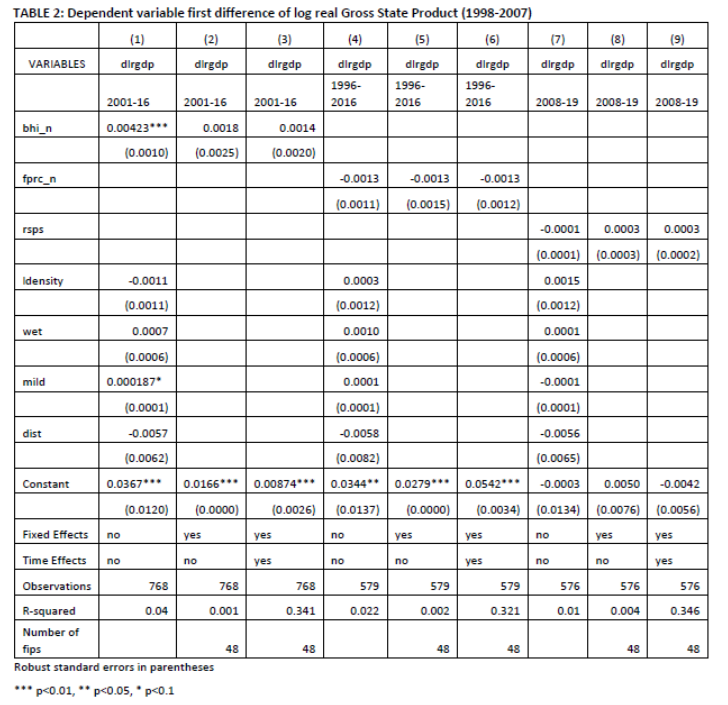Today, ALEC released the latest assessment of state-by-state economic outlook and economic performance, authored by Arthur Laffer, Stephen Moore, and Jonathan Williams.
I have documented the uselessness of the RSPS economic outlook indices here, and here.
More recently, I used the RSPS rankings up through 2019 to predict state level GDP growth, comparing against the Beacon Hill Institute State Competitiveness Index and the Cato Institute Fiscal Report Card. The analysis is here. I reproduce Table 1, for state level GDP.
Columns 7-9 are the relevant ones. The coefficient should be negative and statistically significant so. Column 7 includes state specific variables like log population density (ldensity), precipitation (wet), temperateness (mild), distance from water (dist). Column 8 includes state level fixed effects while column 9 includes both state level and time fixed effects.
Given the higher the rankings (#1, #2,…) the faster the conjectured growth in GDP, the coefficient on RSPS should be negative. In only the specification — with state characteristics included — the coefficient as hypothesized, and then it isn’t statistically significant.


I have a headache – so I don’t feel like looking into this – but let me guess – in the view of Laffer, Moore, and Williams – states with low corporate and income tax rates that provide minimal/crap govt services like education, roads, healthcare and environmental standards for their citizens are considered “rich” and states with higher tax rates and decent/good healthcare, transportation systems, education, and environmental protections are considered “poor”?
ALEC’s index has 15 inputs. Ten involve taxes. One measures the relative size of the public sector. Two involve labor costs. One is “right to work” legislation. The last is a measure of tort exposure. The index components are nothing more than ALEC’s legislative wish list.
“Rich State, Poor State” may be an attempt at a cultural reference, the TV mini-series “Rich Man, Poor Man”:
https://m.imdb.com/title/tt0074048/
If so, it’s another example of the usual cluelessness of appropriationists. The TV series had nothing to do with the claim the ALEC makes regarding economic performance.
The rich/poor claim made in the title of the report is not, in fact, the claim made in the text – it’s a difference between level and change. The text claims that growth is faster in states which screw labor, provide few public services and tax lightly. See Menzie’s table and links for evidence that the growth claim is untrue.
Click in the GDP per capita column in the table here:
https://en.m.wikipedia.org/wiki/List_of_U.S._states_and_territories_by_GDP
to find that the top five states by output per capita are D.C. ( OK, technically not a state) New York, Massachusetts, Washington and California – none of which ranks among ALEC’s “rich” states.
ALEC’s index has 15 inputs. Ten involve taxes. One measures the relative size of the public sector. Two involve labor costs. One is “right to work” legislation. The last is a measure of tort exposure. The index components are nothing more than ALEC’s legislative wish list.
“Rich State, Poor State” may be an attempt at a cultural reference, the TV mini-series “Rich Man, Poor Man”:
https://m.imdb.com/title/tt0074048/
If so, it’s another example of the usual cluelessness of appropriationists. The TV series had nothing to do with the claim the ALEC makes regarding economic performance.
The rich/poor claim made in the title of the report is not, in fact, the claim made in the text – it’s a difference between level and change. The text claims that growth is faster in states which screw labor, provide few public services and tax lightly. See Menzie’s table and links for evidence that the growth claim is untrue.
Different topic but of interest. Putin is definitely an old school Communist:
Russia Seizes Over 650,000 Acres Of Farmland And Other Assets From Company With Ties To ‘Unfriendly’ Country
https://www.msn.com/en-us/money/news/russia-seizes-over-650-000-acres-of-farmland-and-other-assets-from-company-with-ties-to-unfriendly-country/ar-BB1lpugy?ocid=msedgdhp&pc=U531&cvid=53d435d2cc6248ee920bb009020c7a10&ei=41
In a significant escalation of its retaliatory measures against “unfriendly” states amid heightened geopolitical tensions, Russia has seized assets of the agricultural holdings company AgroTerra Group. The move, announced on April 8, 2024, has sent shockwaves through the agricultural sector and raised concerns over food security and international trade relations.
President Vladimir Putin’s decree places Dutch-registered firms AgroTerra Investments B.V. and AgroTerra Holdings B.V. under the “temporary management” of Rosimushchestvo, Russia’s federal property management agency. This action follows a series of similar asset seizures targeting Western companies, including multinational brewer Carlsberg and dairy giant Danone, which have sought to divest their Russian operations in response to the ongoing conflict in Ukraine.
Nah, I disagree. They’ll get parcelled out to his most loyal subordinates. Did you ever see that video of the Finnish intelligence officer describing how Russia actually works, and has worked pretty much since the time of the Mongols?
https://www.youtube.com/watch?v=5F45i0v_u6s
“South Carolina is currently ranked 24th in the United States for its economic outlook.”
To listen to the self serving BS from former governor Nikki Haley, I’m surprised ALEC did not rank them number one. Of course South Carolina in reality is your standard backwards Confederate mess.
Speaking of South Carolina, here is the fluff wrote back in 2017:
https://alec.org/article/state-of-the-state-south-carolina-2/
The Clemson Tigers’ historic win in Monday’s National Championship game may be at forefront of the minds of everyone in South Carolina, but the Palmetto State has much more of which to be proud. Surrounded by lawmakers, loved ones and the citizens of South Carolina, Governor Nikki Haley used her seventh and final State of the State address on Wednesday evening to bid a thankful farewell to a job she called “the greatest honor” of her life and to reflect on the many great strides South Carolina made during her tenure. While much of her address was a “goodbye…for now,” the governor did highlight substantial growth made in jobs, business investment and educational achievement, as well as reforms in ethics, criminal justice and domestic violence. Governor Haley applauded lawmakers and those she lovingly calls “Team South Carolina” for helping change the way the world perceives the state. Touting the success of efficiency and budget reforms, the governor cited that since she took office six years ago, no cabinet agency has run a deficit, the state has doubled its reserve fund and reduced its debt service by half, all while providing significant tax relief to hardworking citizens. Turning to the economy, Governor Haley announced the state has gained over 85,000 jobs in just six years. Over the same period, the unemployment rate has dropped from 11.1 percent to 4.4 percent-the lowest since January 2001. South Carolina has also experienced significant inflows in business investment, attracting $21.5 billion since January of 2011. Every one of the state’s 46 counties experienced job growth, and the state has become a haven for tire, automotive and aeronautics manufacturing. Even amid a difficult year for state budgets everywhere, South Carolina’s commitment to pro-growth reforms has pushed them 32nd to 30th in economic outlook in the Rich States, Poor States: ALEC-Laffer State Economic Competitiveness Index.
OK – Dabo did a good coaching job back then but being ranked 30th out of 50th does not sound that great. Yet – Laffer and Moore had to praise to the heavens Nikki Lightweight even if her state was well below the national average for income per capita. I guess these two clowns will write anything.